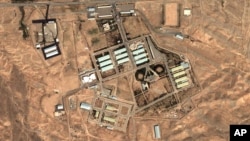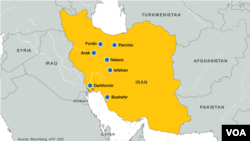The U.N. nuclear agency has again urged Iran to give it access to sites, people and documents it seeks as part of its probe into whether Tehran is trying to develop nuclear weapons.
The head of the International Atomic Energy Agency delegation in Vienna, Hermann Nackaerts, told reporters Monday that they are continuing the dialogue with Iran on its controversial nuclear program in "a positive spirit."
"The aim of us today is to reach agreement on an approach to resolve all outstanding issues with Iran - in particular clarification of the possible military dimensions remains our priority," he said.
Western powers have long suspected Iran of seeking to develop nuclear weapons under the cover of a civilian energy program. Tehran denies the allegations.
One major issue on the agenda for the two days of talks is the IAEA's lack of access to Iran's Parchin military site near Tehran.
Officials suspect Iran has built a container that could house nuclear explosives tests there, and Western diplomats accuse Tehran of trying to remove incriminating evidence before allowing U.N. inspectors inside the facility. Iran has dismissed the allegations as being "childish" and "ridiculous."
The five permanent members of the U.N. Security Council plus Germany are following the Vienna meeting closely, ahead of their talks next week with Iranian officials in Baghdad. The so-called P5+1 countries, which also include the United States, Britain, France, Russia and China, are seeking to assess the possible military capability of Iran's nuclear sites.
Mark Fitzpatrick of the International Institute for Strategic Studies tells VOA that he expects Iran to continue stonewalling the IAEA, which he says could "cast a pall" over the Baghdad meeting. "Iran will demonstrate by its attitude in Vienna whether or not it is in a compromising position. Even if Iran was willing to make some concessions to the IAEA, I expect that they will try to drag it out and try to get some benefits for it when they talk to their negotiating partners in Baghdad," he said.
And if that is the case, Fitzpatrick says there is reason to hope that some sort of interim agreement might emerge from Baghdad that could "at least lower the [political] temperature." "It's not going to produce a solution to the problems, but maybe Iran will be willing to take enough steps to reduce the feeling that they are rushing to be able to produce nuclear weapons as soon as possible," he said.
He says this could alleviate the "great pressure" Iran has been feeling under multiple rounds of international sanctions.
On Monday, The Washington Post newspaper quoted unnamed U.S. officials as saying Iran has been routinely switching off satellite tracking systems on its sea-bound oil tankers since early April in an effort to circumvent sanctions. The tactics are only modestly effective in hiding the massive tankers. Iran relies on oil exports for the majority of its foreign currency earnings.
The newspaper reports that the International Energy Agency is closely watching the situation, which if true, also would be a violation of maritime law.
The head of the International Atomic Energy Agency delegation in Vienna, Hermann Nackaerts, told reporters Monday that they are continuing the dialogue with Iran on its controversial nuclear program in "a positive spirit."
"The aim of us today is to reach agreement on an approach to resolve all outstanding issues with Iran - in particular clarification of the possible military dimensions remains our priority," he said.
Western powers have long suspected Iran of seeking to develop nuclear weapons under the cover of a civilian energy program. Tehran denies the allegations.
One major issue on the agenda for the two days of talks is the IAEA's lack of access to Iran's Parchin military site near Tehran.
Officials suspect Iran has built a container that could house nuclear explosives tests there, and Western diplomats accuse Tehran of trying to remove incriminating evidence before allowing U.N. inspectors inside the facility. Iran has dismissed the allegations as being "childish" and "ridiculous."
The five permanent members of the U.N. Security Council plus Germany are following the Vienna meeting closely, ahead of their talks next week with Iranian officials in Baghdad. The so-called P5+1 countries, which also include the United States, Britain, France, Russia and China, are seeking to assess the possible military capability of Iran's nuclear sites.
Mark Fitzpatrick of the International Institute for Strategic Studies tells VOA that he expects Iran to continue stonewalling the IAEA, which he says could "cast a pall" over the Baghdad meeting. "Iran will demonstrate by its attitude in Vienna whether or not it is in a compromising position. Even if Iran was willing to make some concessions to the IAEA, I expect that they will try to drag it out and try to get some benefits for it when they talk to their negotiating partners in Baghdad," he said.
And if that is the case, Fitzpatrick says there is reason to hope that some sort of interim agreement might emerge from Baghdad that could "at least lower the [political] temperature." "It's not going to produce a solution to the problems, but maybe Iran will be willing to take enough steps to reduce the feeling that they are rushing to be able to produce nuclear weapons as soon as possible," he said.
He says this could alleviate the "great pressure" Iran has been feeling under multiple rounds of international sanctions.
On Monday, The Washington Post newspaper quoted unnamed U.S. officials as saying Iran has been routinely switching off satellite tracking systems on its sea-bound oil tankers since early April in an effort to circumvent sanctions. The tactics are only modestly effective in hiding the massive tankers. Iran relies on oil exports for the majority of its foreign currency earnings.
The newspaper reports that the International Energy Agency is closely watching the situation, which if true, also would be a violation of maritime law.
|
Join the conversation on our social journalism site - Middle East Voices. Follow our Middle East reports on Twitter and discuss them on our Facebook page. |


